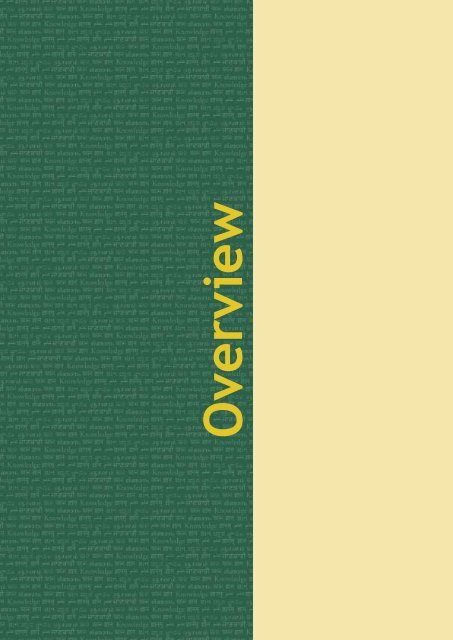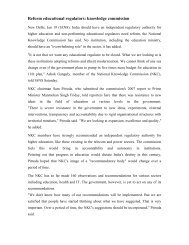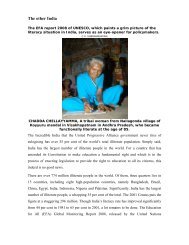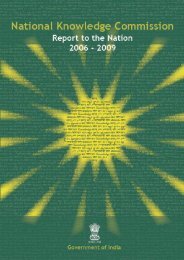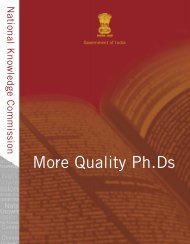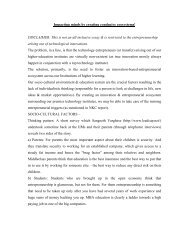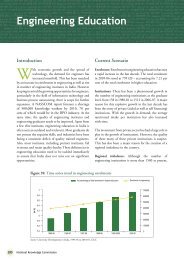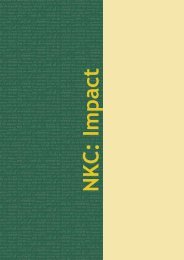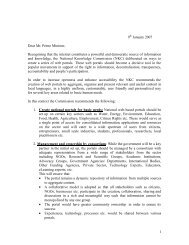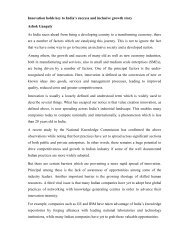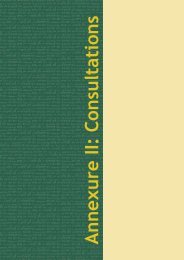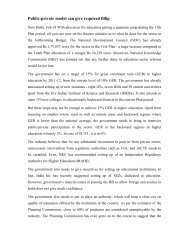National Knowledge Commission Report to the Nation 2009: Overview
National Knowledge Commission Report to the Nation 2009: Overview
National Knowledge Commission Report to the Nation 2009: Overview
Create successful ePaper yourself
Turn your PDF publications into a flip-book with our unique Google optimized e-Paper software.
<strong>Overview</strong><br />
<strong>Report</strong> <strong>to</strong> <strong>the</strong> <strong>Nation</strong><br />
1
Introduction<br />
<strong>Knowledge</strong> has been recognised as <strong>the</strong> key driving<br />
force in <strong>the</strong> 21st century and India’s ability <strong>to</strong><br />
emerge as a globally competitive player will<br />
substantially depend on its knowledge resources. To foster<br />
generational change, a systemic transformation is required<br />
that seeks <strong>to</strong> address <strong>the</strong> concerns of <strong>the</strong> entire knowledge<br />
spectrum. This massive endeavour involves creating a<br />
roadmap for reform of <strong>the</strong> knowledge sec<strong>to</strong>r that focuses<br />
on enhancing access <strong>to</strong> knowledge, fundamentally<br />
improving education systems and <strong>the</strong>ir delivery, re-shaping<br />
<strong>the</strong> research, development and innovation structures, and<br />
harnessing knowledge applications for generating better<br />
services. Such a knowledge revolution that seeks <strong>to</strong> build<br />
capacity and generate quality will enable our country <strong>to</strong><br />
empower its human capital – including <strong>the</strong> 550 million<br />
below <strong>the</strong> age of 25. Our unique demographic dividend<br />
offers a tremendous opportunity as well as a daunting<br />
challenge which requires creative strategies for a new<br />
knowledge oriented paradigm.<br />
Keeping this scenario in mind, <strong>the</strong> <strong><strong>Nation</strong>al</strong><br />
<strong>Knowledge</strong> <strong>Commission</strong> (NKC) was constituted in<br />
June 2005 by <strong>the</strong> Prime Minister Dr. Manmohan<br />
Singh, under <strong>the</strong> Chairmanship of Mr. Sam<br />
Pitroda, <strong>to</strong> prepare a blueprint for reform of our<br />
knowledge related institutions and infrastructure<br />
which would enable India <strong>to</strong> meet <strong>the</strong> challenges<br />
of <strong>the</strong> future. The Terms of Reference of NKC are:<br />
• Build excellence in <strong>the</strong> educational system <strong>to</strong> meet<br />
<strong>the</strong> knowledge challenges of <strong>the</strong> 21st century and<br />
increase India’s competitive advantage in fields of<br />
knowledge.<br />
• Promote creation of knowledge in Science &<br />
Technology labora<strong>to</strong>ries.<br />
• Improve <strong>the</strong> management of institutions engaged<br />
in Intellectual Property Rights.<br />
• Promote knowledge applications in Agriculture and<br />
Industry.<br />
• Promote <strong>the</strong> use of knowledge capabilities in<br />
making government an effective, transparent and<br />
accountable service provider <strong>to</strong> <strong>the</strong> citizen and<br />
promote widespread sharing of knowledge <strong>to</strong><br />
maximise public benefit.<br />
To take its mandate forward <strong>the</strong> <strong>Commission</strong> focused<br />
on five key aspects of knowledge: enhancing access<br />
<strong>to</strong> knowledge, reinvigorating institutions where<br />
knowledge concepts are imparted, creating a world class<br />
environment for creation of knowledge, promoting<br />
applications of knowledge for sustained and inclusive<br />
growth and using knowledge applications in efficient<br />
delivery of public services. Specific focus areas were<br />
identified <strong>to</strong> realise each of <strong>the</strong>se objectives. NKC<br />
carried out wide stakeholder consultations, in particular<br />
engaging non-government organisations and experts<br />
in <strong>the</strong> form of Working Groups, while formulating<br />
recommendations.<br />
In three years NKC has submitted recommendations<br />
on 27 focus areas in <strong>the</strong> form of letters <strong>to</strong> <strong>the</strong> Prime<br />
Minister. These have been widely disseminated in three<br />
compilations: ‘<strong>Report</strong> <strong>to</strong> <strong>the</strong> <strong>Nation</strong> 2006’, ‘<strong>Report</strong><br />
<strong>to</strong> <strong>the</strong> <strong>Nation</strong> 2007’ as well as ‘Towards a <strong>Knowledge</strong><br />
Society’ which is a compilation of <strong>the</strong> education<br />
recommendations. The recommendations, also accessible<br />
through <strong>the</strong> NKC website, have been widely debated.<br />
NKC has also reached out <strong>to</strong> State Governments for<br />
developing knowledge initiatives at <strong>the</strong> state level.<br />
<strong>Report</strong> <strong>to</strong> <strong>the</strong> <strong>Nation</strong><br />
3
Terms of Reference and Organisation<br />
The <strong><strong>Nation</strong>al</strong> <strong>Knowledge</strong> <strong>Commission</strong> (NKC) was<br />
constituted on 13th June 2005 as a high level advisory<br />
body <strong>to</strong> <strong>the</strong> Prime Minister of India. The vision for<br />
NKC was articulated by Dr. Manmohan Singh, Prime<br />
Minister of India, in <strong>the</strong> following words:<br />
“The time has come <strong>to</strong> create a second wave of institution<br />
building, and of excellence in <strong>the</strong> fields of education,<br />
research and capability building.”<br />
The Terms of Reference of NKC are:<br />
• Build excellence in <strong>the</strong> educational system <strong>to</strong> meet<br />
<strong>the</strong> knowledge challenges of <strong>the</strong> 21st century and<br />
increase India’s competitive advantage in fields of<br />
knowledge.<br />
• Promote creation of knowledge in Science &<br />
Technology labora<strong>to</strong>ries.<br />
• Improve <strong>the</strong> management of institutions engaged<br />
in Intellectual Property Rights.<br />
• Promote knowledge applications in Agriculture and<br />
Industry.<br />
• Promote <strong>the</strong> use of knowledge capabilities in<br />
making government an effective, transparent and<br />
accountable service provider <strong>to</strong> <strong>the</strong> citizen and<br />
promote widespread sharing of knowledge <strong>to</strong><br />
maximise public benefit.<br />
<strong><strong>Nation</strong>al</strong> <strong>Knowledge</strong> <strong>Commission</strong> had a designated<br />
time-frame of three years from 2nd Oc<strong>to</strong>ber 2005<br />
<strong>to</strong> 2nd Oc<strong>to</strong>ber 2008, which was extended <strong>to</strong><br />
31st March <strong>2009</strong>.<br />
The final <strong>Report</strong> of NKC contains <strong>the</strong> full text of all<br />
<strong>the</strong> recommendations submitted by <strong>the</strong> <strong>Commission</strong><br />
in <strong>the</strong> last three years. It also includes follow up on <strong>the</strong><br />
recommendations, baseline figures on <strong>the</strong> key focus<br />
areas as well as details of NKC consultations.<br />
Organisation<br />
NKC consists of eight Members, including <strong>the</strong> Chairman. All Members perform <strong>the</strong>ir duties<br />
on a part-time basis and do not claim any remuneration.<br />
The Members are assisted in <strong>the</strong>ir duties by a small Technical Support Staff. The <strong>Commission</strong><br />
is also free <strong>to</strong> co-opt experts <strong>to</strong> assist in <strong>the</strong> management of its tasks.<br />
The Planning <strong>Commission</strong> is <strong>the</strong> nodal agency for <strong>the</strong> NKC for planning and budgeting<br />
purposes as well as for handling Parliament submissions or responses.<br />
Prime Minister<br />
Planning<br />
<strong>Commission</strong><br />
NKC<br />
Chairman<br />
Members<br />
Staff<br />
Ministers/<br />
States<br />
4 <strong><strong>Nation</strong>al</strong> <strong>Knowledge</strong> <strong>Commission</strong>
Members<br />
Mr. Sam Pitroda (Chairman)<br />
Mr. Pitroda has spent four decades in <strong>the</strong> world of<br />
telecommunications, having pioneered its use as a means<br />
<strong>to</strong> expedite <strong>the</strong> process of development and nation<br />
building, and in bridging <strong>the</strong> global communications<br />
divide. His professional career has been divided<br />
between <strong>the</strong> three continents of North America,<br />
Asia and Europe, and he has received international<br />
acclaim for using telecommunications as a <strong>to</strong>ol for<br />
national development.<br />
As Adviser <strong>to</strong> Prime Minister Rajiv Gandhi,<br />
Mr. Pitroda helped <strong>to</strong> build India’s telecommunications<br />
and information technology infrastructure. He was <strong>the</strong><br />
founding Chairman of <strong>the</strong> Telecom <strong>Commission</strong> in<br />
India and headed <strong>the</strong> <strong><strong>Nation</strong>al</strong> Technology Missions on<br />
Drinking Water, Literacy, Immunisation, Oilseeds and<br />
Dairy. In <strong>the</strong>se roles, he made a notable contribution <strong>to</strong><br />
India’s developmental planning and policy approaches.<br />
Mr. Pitroda has owned and run several companies in<br />
<strong>the</strong> United States and Europe; as an inven<strong>to</strong>r he owns<br />
more than 75 patents worldwide. He is also a recipient<br />
of <strong>the</strong> Padma Bhushan.<br />
Dr. Ashok Ganguly<br />
Dr. Ganguly is <strong>the</strong> Chairman of Firstsource Ltd. and<br />
ABP Pvt. Ltd., and a Direc<strong>to</strong>r on <strong>the</strong> Central Board of<br />
<strong>the</strong> Reserve Bank of India, since November 2000. He<br />
heads his own consulting company, Technology Network<br />
India Pvt. Ltd. He also currently serves as a non-executive<br />
direc<strong>to</strong>r of Mahindra & Mahindra, Wipro Ltd. Tata AIG<br />
Life Insurance Co Ltd. and ICICI <strong>Knowledge</strong> Park.<br />
He is a member of <strong>the</strong> Prime Minister’s Council on Trade<br />
and Industry as well as <strong>the</strong> Investment <strong>Commission</strong>.<br />
Dr. Ganguly’s professional career spanned 35 years with<br />
Unilever Plc/N.V. He was <strong>the</strong> Chairman of Hindustan<br />
Lever Ltd. from 1980 <strong>to</strong> 1990 and a member of <strong>the</strong><br />
Unilever Board from 1990 <strong>to</strong> 1997, with responsibility<br />
for worldwide research and technology.<br />
He was a member of <strong>the</strong> Science Advisory Council <strong>to</strong><br />
<strong>the</strong> Prime Minister of India (1985-89) and <strong>the</strong> UK<br />
Advisory Board of Research Councils (1991-94). A<br />
recipient of <strong>the</strong> Padma Vibhushan and an Honorary<br />
Professor at <strong>the</strong> Chinese Academy of Science,<br />
Dr. Ganguly has authored three books – Industry and<br />
Liberalisation, Strategic Manufacturing for Competitive<br />
Advantage and Business Driven R&D - Managing<br />
<strong>Knowledge</strong> <strong>to</strong> Create Wealth.<br />
Dr. P. Balaram<br />
Professor P. Balaram is a Professor of Molecular<br />
Biophysics and currently <strong>the</strong> Direc<strong>to</strong>r of <strong>the</strong> Indian<br />
Institute of Science, Bangalore. Prior <strong>to</strong> this, he was<br />
Lecturer (1973-77), Assistant Professor (1977-82),<br />
Associate Professor (1982-85), Chairman, Molecular<br />
Biophysics Unit (1995-2000) and Chairman, Division<br />
of Biological Sciences (2002-05) at <strong>the</strong> Institute. His<br />
main research interests are in bio-organic chemistry<br />
and molecular biophysics. He is <strong>the</strong> author of over 370<br />
research papers. He received his M.Sc from IIT Kanpur<br />
(1969) and Ph.D in Chemistry from Carnegie-Mellon,<br />
Pittsburgh, USA (1972).<br />
Professor Balaram is a Fellow of <strong>the</strong> Indian Academy<br />
of Sciences, Indian <strong><strong>Nation</strong>al</strong> Science Academy and<br />
<strong>the</strong> Third World Academy of Sciences, Trieste, Italy.<br />
Professor Balaram has received many awards and<br />
honours in recognition of his work, including <strong>the</strong> Shanti<br />
Swarup Bhatnagar Prize, CSIR (1986), Alumni Award<br />
for Excellence in Research, IISc (1991), TWAS Award<br />
in Chemistry (1994), G.D. Birla Award for Scientific<br />
Research (1994) and <strong>the</strong> Padma Shri awarded by <strong>the</strong><br />
Government of India (2002).<br />
Professor Balaram currently serves on many committees<br />
of <strong>the</strong> Government of India, and is a Member, Science<br />
Advisory Committee <strong>to</strong> <strong>the</strong> Union Cabinet, Board of<br />
Research in Nuclear Science of DAE, Advisory Board<br />
of CSIR and Scientific Advisory Council <strong>to</strong> <strong>the</strong> Prime<br />
Minister. He has been <strong>the</strong> Edi<strong>to</strong>r of “Current Science”<br />
for over ten years.<br />
<strong>Report</strong> <strong>to</strong> <strong>the</strong> <strong>Nation</strong><br />
5
Dr. Jayati Ghosh<br />
Dr. Ghosh is a Professor of Economics and Chairperson<br />
of <strong>the</strong> Centre for Economic Studies and Planning,<br />
School of Social Sciences, Jawaharlal Nehru University,<br />
and is an alumnus of Delhi University, Jawaharlal<br />
Nehru University and <strong>the</strong> University of Cambridge. Her<br />
research interests include globalisation, international<br />
trade and finance, employment patterns in developing<br />
countries, macroeconomic policy, and issues related <strong>to</strong><br />
gender and development.<br />
Her published works include Crisis as a Conquest:<br />
Learning from East Asia, The Market that Failed: A<br />
Decade of Neoliberal Economic Reforms in India, and<br />
Work and Well-being in <strong>the</strong> Age of Finance (co-authored<br />
with Prof. C.P. Chandrashekhar). She was <strong>the</strong> principal<br />
author of <strong>the</strong> West Bengal Human Development<br />
<strong>Report</strong> 2004 which received <strong>the</strong> UNDP Award for<br />
excellence in analysis, and numerous academic papers.<br />
She is a regular columnist for leading journals and<br />
periodicals. Dr. Ghosh is involved in managing several<br />
public information websites, a founder of <strong>the</strong> Economic<br />
Research Foundation, and is <strong>the</strong> Executive Secretary<br />
of International Development Economics Associates<br />
(IDEAS), an international network of heterodox<br />
development economists. She chaired <strong>the</strong> Andhra<br />
Pradesh <strong>Commission</strong> on Farmers’ Welfare in 2004,<br />
and continues <strong>to</strong> be closely involved in working with<br />
progressive organisations and social movements.<br />
Dr. Deepak Nayyar<br />
Dr Nayyar is Professor of Economics at Jawaharlal<br />
Nehru University, New Delhi. Earlier, he has taught at<br />
<strong>the</strong> University of Oxford, <strong>the</strong> University of Sussex, and<br />
<strong>the</strong> Indian Institute of Management, Calcutta. Professor<br />
Nayyar was Vice Chancellor of <strong>the</strong> University of Delhi<br />
from 2000 <strong>to</strong> 2005. He also served as Chief Economic<br />
Adviser <strong>to</strong> <strong>the</strong> Government of India and Secretary in <strong>the</strong><br />
Ministry of Finance.<br />
He was educated at St. Stephen’s College, University of<br />
Delhi. Thereafter, as a Rhodes Scholar, he went on <strong>to</strong><br />
study at Balliol College, University of Oxford, where he<br />
obtained a B. Phil and a D. Phil in Economics. He has<br />
received <strong>the</strong> V.K.R.V. Rao Award for his contribution<br />
<strong>to</strong> research in Economics. He is an Honorary Fellow of<br />
Balliol College, Oxford.<br />
He has published more than 50 papers in academic<br />
journals and is <strong>the</strong> author of 12 books, which<br />
include India’s Exports and Export Policies; Migration,<br />
Remittances and Capital Flows; The Intelligent Person’s<br />
Guide <strong>to</strong> Liberalization; Governing Globalization: Issues<br />
and Institutions; Stability with Growth: Macroeconomics,<br />
Liberalization and Development; Trade and Globalization;<br />
and Liberalization and Development.<br />
Professor Nayyar is Chairman of <strong>the</strong> Board of Governors<br />
of <strong>the</strong> UNU World Institute for Development<br />
Economics Research, Helsinki and is Vice President of<br />
<strong>the</strong> International Association of Universities, Paris. He<br />
has also served as a Member of <strong>the</strong> Board of Direc<strong>to</strong>rs<br />
of <strong>the</strong> Social Science Research Council in <strong>the</strong> United<br />
States, and Chairman of <strong>the</strong> Advisory Council for <strong>the</strong><br />
Department of International Development, Queen<br />
Elizabeth House, University of Oxford. He was a<br />
Member of <strong>the</strong> World <strong>Commission</strong> on <strong>the</strong> Social<br />
Dimension of Globalization.<br />
Mr. Nandan Nilekani<br />
One of <strong>the</strong> founders of Infosys Technologies Ltd.<br />
Mr. Nilekani is <strong>the</strong> Co-Chairman of <strong>the</strong> Board of<br />
Direc<strong>to</strong>rs. He has formerly held <strong>the</strong> post of Managing<br />
Direc<strong>to</strong>r, President and Chief Operating Officer at<br />
Infosys. Mr. Nilekani co-founded India’s <strong><strong>Nation</strong>al</strong><br />
Association of Software and Service Companies<br />
(NASSCOM). He is Vice-Chairman of The<br />
Conference Board, Inc., an international research and<br />
business membership organisation and Member of<br />
<strong>the</strong> London Business School’s Asia-Pacific Regional<br />
Advisory Board. He has served as Chairman of <strong>the</strong><br />
Government of India’s IT Task Force for <strong>the</strong> power<br />
sec<strong>to</strong>r. He was a member of <strong>the</strong> insider trading<br />
subcommittee of <strong>the</strong> Securities and Exchange Board<br />
of India (SEBI), and of <strong>the</strong> Reserve Bank of India’s<br />
Advisory Group on corporate governance. He is also<br />
a member of <strong>the</strong> review committee of <strong>the</strong> Jawaharlal<br />
Nehru <strong><strong>Nation</strong>al</strong> Urban Renewal Mission and serves on<br />
<strong>the</strong> Board of Reuters as a non-executive member.<br />
His many honours include Fortune magazine’s ‘Asia’s<br />
Businessmen of <strong>the</strong> Year 2003’ award (along with Infosys<br />
Chairman Mr. N.R. Narayana Murthy), <strong>the</strong> Corporate<br />
Citizen of <strong>the</strong> Year Award at <strong>the</strong> Asia Business Leader<br />
Awards (2004) and Padma Bhushan (2006). In 2002 and<br />
2003 he was named among <strong>the</strong> ‘World’s Most Respected<br />
Business Leaders’ in a global survey by Financial Times and<br />
PricewaterhouseCoopers.<br />
Mr. Nilekani became one of <strong>the</strong> youngest entrepreneurs<br />
<strong>to</strong> join 20 global leaders on <strong>the</strong> prestigious World<br />
6 <strong><strong>Nation</strong>al</strong> <strong>Knowledge</strong> <strong>Commission</strong>
Economic Forum (WEF) Foundation Board in<br />
January 2006.<br />
Dr. Sujatha Ramdorai<br />
Dr. Sujatha Ramdorai is a Professor at <strong>the</strong> School of<br />
Ma<strong>the</strong>matics, Tata Institute of Fundamental Research<br />
(TIFR). She has held visiting positions in several<br />
universities and research institutions around <strong>the</strong> world.<br />
Currently she is a visiting Professor at <strong>the</strong> Chennai<br />
Ma<strong>the</strong>matical Institute.<br />
Dr. Ramdorai is a recipient of <strong>the</strong> Shanti Swarup<br />
Bhatnagar Award and <strong>the</strong> ICTP Srinivasa Ramanujan<br />
Medal awarded by <strong>the</strong> Norwegian Academy of Science<br />
and Letters for her research in algebraic number <strong>the</strong>ory.<br />
She has been involved with issues related <strong>to</strong> education<br />
and research, especially research in <strong>the</strong> pure sciences<br />
in India. She has authored several research papers in<br />
internationally reputed journals and has collaborated<br />
widely in her research work. She is <strong>the</strong> co-author (with<br />
Prof. J. Coates) of Cyclo<strong>to</strong>mic Fields and Zeta Values.<br />
Dr. Amitabh Mat<strong>to</strong>o<br />
Professor Mat<strong>to</strong>o is a Doc<strong>to</strong>rate in International Relations<br />
from <strong>the</strong> University of Oxford, United Kingdom. He is<br />
<strong>the</strong> former Vice Chancellor of <strong>the</strong> University of Jammu.<br />
He was also Professor of International Relations at<br />
Jawaharlal Nehru University and concurrently Direc<strong>to</strong>r<br />
of <strong>the</strong> Core Group for <strong>the</strong> Study of <strong><strong>Nation</strong>al</strong> Security.<br />
Professor Mat<strong>to</strong>o is on <strong>the</strong> Governing Council of <strong>the</strong><br />
Pugwash Conference on Science and World Affairs, on<br />
<strong>the</strong> Board of <strong>the</strong> India-Afghanistan Foundation and <strong>the</strong><br />
President of <strong>the</strong> Jammu and Kashmir chapter of SPIC-<br />
MACAY.<br />
Professor Mat<strong>to</strong>o has been on <strong>the</strong> Governing Council of<br />
<strong>the</strong> Nuclear Science Centre; a member of <strong>the</strong> Standing<br />
Committee of <strong>the</strong> Association of Indian Universities; and<br />
on <strong>the</strong> Executive Council of several Universities. He has<br />
been <strong>the</strong> recipient of several national and international<br />
awards and was, till recently, a member of India’s <strong><strong>Nation</strong>al</strong><br />
Security Council’s Advisory Board. In 2008 he was<br />
conferred <strong>the</strong> Padma Shri by <strong>the</strong> Government of India.<br />
<strong>Report</strong> <strong>to</strong> <strong>the</strong> <strong>Nation</strong><br />
7
Methodology<br />
• Identification of key focus areas<br />
• Identification of diverse stakeholders and understanding major issues<br />
• Constitution of Working Groups and organising of workshops/seminars, extensive consultations with concerned<br />
experts and stakeholders<br />
• Consultation with administrative Ministries & <strong>the</strong> Planning <strong>Commission</strong><br />
• Discussion in NKC <strong>to</strong> finalise recommendations in <strong>the</strong> form of letter <strong>to</strong> <strong>the</strong> PM from <strong>the</strong> Chairman<br />
• Letter <strong>to</strong> PM containing key recommendations, first steps, financial implications etc. supported by <strong>the</strong> relevant<br />
explana<strong>to</strong>ry documents by NKC<br />
• Dissemination of recommendations <strong>to</strong> State Governments, civil society and o<strong>the</strong>r stakeholders<br />
• Initiating <strong>the</strong> implementation of <strong>the</strong> recommendations under <strong>the</strong> aegis of <strong>the</strong> Prime Minister’s Office<br />
• Coordinating and following up implementation of proposals<br />
Working Groups<br />
Libraries, Language, <strong>Knowledge</strong> Applications in<br />
Agriculture, Health Information Network, Higher<br />
Education, Medical Education, Legal Education,<br />
Management Education, Engineering Education,<br />
Traditional Health Systems, More Students in Maths<br />
and Science, Open and Distance Education, Using<br />
<strong>Knowledge</strong> for Enhancing Quality of Life<br />
Workshops/Seminars<br />
Literacy, Translation, Networks, School Education,<br />
Muslim Education, Vocational Education, Open and<br />
Distance Education, Intellectual Property Rights,<br />
Science and Technology, Agriculture, Open Education<br />
Resources, Portals, Quality of Life, More Quality Ph.Ds<br />
Surveys<br />
Innovation, Health Information Network,<br />
Traditional Health Systems, Entrepreneurship,<br />
More Quality Ph.Ds<br />
8 <strong><strong>Nation</strong>al</strong> <strong>Knowledge</strong> <strong>Commission</strong>
Methodology<br />
The methodology followed by <strong>the</strong> <strong><strong>Nation</strong>al</strong><br />
<strong>Knowledge</strong> <strong>Commission</strong> involves identification<br />
of focus areas in <strong>the</strong> first instance. This selection<br />
arises from wide consultation, within and outside <strong>the</strong><br />
government. After <strong>the</strong> identification of focus areas,<br />
Working Groups of specialists and practitioners are<br />
constituted. Working Groups typically consist of five<br />
<strong>to</strong> ten experts, and meet periodically over three <strong>to</strong> four<br />
months in order <strong>to</strong> prepare a report. Working Group<br />
reports are one of <strong>the</strong> inputs used by <strong>the</strong> NKC during<br />
deliberations <strong>to</strong> frame its recommendations. In addition,<br />
workshops and seminars are held periodically along<br />
with informal consultations with concerned experts<br />
and stakeholders <strong>to</strong> get as broad-based a point of view<br />
as possible.<br />
Following this, NKC Members discuss <strong>the</strong> issues raised<br />
during Consultations and in <strong>the</strong> Working Group<br />
<strong>Report</strong>s <strong>to</strong> finalise recommendations. After several<br />
rounds of deliberations, a letter is sent <strong>to</strong> <strong>the</strong> Prime<br />
Minister containing key recommendations. Widespread<br />
dissemination of NKC recommendations <strong>to</strong> State<br />
Governments, civil society and o<strong>the</strong>r stakeholders takes<br />
place after <strong>the</strong> recommendations have been received<br />
by <strong>the</strong> Prime Minister and <strong>the</strong> relevant ministries. The<br />
implementation of <strong>the</strong> recommendations under <strong>the</strong><br />
aegis of <strong>the</strong> Prime Minister’s Office is <strong>the</strong>n initiated,<br />
along with coordination and follow up with various<br />
implementing agencies. Key steps include:<br />
• Identification of key focus areas<br />
• Identification of diverse stakeholders and<br />
understanding major issues in <strong>the</strong> area<br />
• Constitution of Working Groups and organising<br />
of workshops/seminars, extensive formal and<br />
informal consultations with concerned experts and<br />
stakeholders<br />
• Consultation with administrative Ministries & <strong>the</strong><br />
Planning <strong>Commission</strong><br />
• Discussion in NKC <strong>to</strong> finalise recommendations in<br />
<strong>the</strong> form of letter <strong>to</strong> <strong>the</strong> PM from <strong>the</strong> Chairman<br />
• Letter <strong>to</strong> PM containing key recommendations,<br />
first steps, financial implications etc. supported by<br />
<strong>the</strong> relevant explana<strong>to</strong>ry documents by NKC<br />
• Dissemination of recommendations <strong>to</strong> State<br />
Governments, civil society and o<strong>the</strong>r stakeholders<br />
• Initiating <strong>the</strong> implementation of <strong>the</strong><br />
recommendations under <strong>the</strong> aegis of <strong>the</strong> Prime<br />
Minister’s Office<br />
• Coordinating and following up implementation of<br />
proposals.<br />
<strong>Report</strong> <strong>to</strong> <strong>the</strong> <strong>Nation</strong><br />
9
NKC<br />
Snapshot<br />
Recommendations submitted in 2006<br />
• Libraries<br />
• Translation<br />
• Language<br />
• <strong><strong>Nation</strong>al</strong> <strong>Knowledge</strong> Network<br />
• Right <strong>to</strong> Education<br />
• Vocational Education & Training<br />
• Higher Education<br />
• <strong><strong>Nation</strong>al</strong> Science and Social Science Foundation<br />
• E-governance<br />
Recommendations submitted in 2007<br />
• Health Information Network<br />
• Portals<br />
• Open Educational Resources<br />
• Legal Education<br />
• Medical Education<br />
• Management Education<br />
• Open and Distance Education<br />
• Intellectual Property Rights<br />
• Innovation<br />
• Traditional Health Systems<br />
• Legal Framework for Public Funded Research<br />
Recommendations submitted in 2008<br />
• School Education<br />
• Engineering Education<br />
• More Talented Students in Maths and Science<br />
• More Quality Ph.Ds<br />
• Entrepreneurship<br />
Recommendations submitted in <strong>2009</strong><br />
• <strong>Knowledge</strong> Applications in Agriculture<br />
• <strong>Knowledge</strong> Applications for Enhancing<br />
Quality of Life<br />
10 <strong><strong>Nation</strong>al</strong> <strong>Knowledge</strong> <strong>Commission</strong>
<strong>Knowledge</strong> Pentagon<br />
Access <strong>to</strong> <strong>Knowledge</strong><br />
<strong>Knowledge</strong> Concepts<br />
Delivery of Services<br />
Creation of <strong>Knowledge</strong><br />
<strong>Knowledge</strong> Applications<br />
<strong>Report</strong> <strong>to</strong> <strong>the</strong> <strong>Nation</strong><br />
11
Summary of<br />
Recommendations<br />
ACCESS<br />
Providing access <strong>to</strong> knowledge is <strong>the</strong> most<br />
fundamental way of increasing <strong>the</strong> opportunities<br />
of individuals and groups. Therefore, it is essential<br />
<strong>to</strong> revitalise and expand <strong>the</strong> reach of knowledge in society.<br />
In this context NKC has submitted recommendations<br />
on areas such as Right <strong>to</strong> Education, libraries, language,<br />
translation, portals and knowledge networks.<br />
• Right <strong>to</strong> Education: The 86th Constitutional<br />
amendment act made <strong>the</strong> Right <strong>to</strong> Education<br />
a Fundamental Right. However, <strong>to</strong> enhance<br />
universal access <strong>to</strong> quality education for Indian<br />
children, NKC recommends that <strong>the</strong>re is a need<br />
for a central legislation affirming <strong>the</strong> Right <strong>to</strong><br />
Education. This must entail a financial provision<br />
requiring <strong>the</strong> central government <strong>to</strong> provide <strong>the</strong><br />
bulk of <strong>the</strong> additional funds needed for realising<br />
<strong>the</strong> Right <strong>to</strong> Education. The legislation should<br />
also lay down minimum standards of quality in<br />
school education and for it <strong>to</strong> be effective, <strong>the</strong><br />
responsibility of <strong>the</strong> Government at different<br />
levels, must be recognised and made justiciable.<br />
• Language: In <strong>the</strong> current scenario an understanding<br />
and command over <strong>the</strong> English language is a most<br />
important determinant of access <strong>to</strong> higher education,<br />
employment possibilities and social opportunities.<br />
NKC <strong>the</strong>refore recommends that <strong>the</strong> teaching of<br />
English as a language should be introduced, along<br />
with <strong>the</strong> first language (ei<strong>the</strong>r mo<strong>the</strong>r <strong>to</strong>ngue or <strong>the</strong><br />
regional language) of <strong>the</strong> child, starting from Class<br />
I. Fur<strong>the</strong>r, NKC has also focused on <strong>the</strong> need <strong>to</strong><br />
reform <strong>the</strong> pedagogy of English language teaching<br />
and <strong>the</strong> use of all available media <strong>to</strong> supplement<br />
traditional teaching methods.<br />
• Translation: In a multilingual country, translation<br />
should play a critical role in making knowledge<br />
available <strong>to</strong> different linguistic groups. NKC has<br />
recommended developing translation as an industry<br />
and setting up a <strong><strong>Nation</strong>al</strong> Translation Mission with<br />
a focus on promoting translation activities across<br />
<strong>the</strong> country. The Mission would undertake a host<br />
of activities such as setting up a s<strong>to</strong>rehouse of<br />
information on all aspects of translation, providing<br />
quality training and education for transla<strong>to</strong>rs,<br />
and creating and maintaining various <strong>to</strong>ols for<br />
translation.<br />
• Libraries: To revamp <strong>the</strong> Library and Information<br />
Services (LIS) sec<strong>to</strong>r NKC has recommended a<br />
comprehensive census of libraries, modernising<br />
management of libraries <strong>to</strong> ensure greater<br />
community participation, including models for<br />
public private partnerships in LIS development<br />
and leveraging ICT for various applications.<br />
For sustained attention <strong>to</strong> <strong>the</strong> sec<strong>to</strong>r, NKC has<br />
recommended <strong>the</strong> setting up of an independent<br />
<strong><strong>Nation</strong>al</strong> <strong>Commission</strong> on Libraries which would<br />
streamline all development initiatives in <strong>the</strong> sec<strong>to</strong>r.<br />
• <strong><strong>Nation</strong>al</strong> <strong>Knowledge</strong> Network: The key <strong>to</strong> successful<br />
research <strong>to</strong>day demands live consultations, data<br />
and resource sharing. Towards this end, NKC has<br />
recommended <strong>the</strong> establishment of a high-end<br />
<strong><strong>Nation</strong>al</strong> <strong>Knowledge</strong> Network connecting all our<br />
knowledge institutions in various fields and at<br />
various locations throughout <strong>the</strong> country, through<br />
an electronic digital broadband network with<br />
gigabit capacity.<br />
• Portals: NKC has also proposed <strong>the</strong> creation of<br />
national web based portals on certain key sec<strong>to</strong>rs<br />
such as Water, Energy, Environment, Teachers,<br />
Biodiversity, Health, Agriculture, Employment,<br />
Citizens Rights etc. The portals would serve as a<br />
single window for information on <strong>the</strong> given sec<strong>to</strong>r<br />
for all stakeholders and would be managed by a<br />
consortium consisting of representatives from a<br />
wide range of stakeholders <strong>to</strong> ensure that <strong>the</strong>y<br />
have a national character. NKC has facilitated <strong>the</strong><br />
setting up of five portals: on Water, championed<br />
by Arghyam Trust; on Energy, championed by The<br />
Energy Research Institute (TERI); on Environment,<br />
<strong>Report</strong> <strong>to</strong> <strong>the</strong> <strong>Nation</strong><br />
13
championed by <strong>the</strong> Centre for Science and<br />
Environment (CSE); on Teachers, championed by<br />
<strong>the</strong> Azim Premji Foundation; and on Biodiversity,<br />
championed by <strong>the</strong> Ashoka Trust for Research in<br />
Ecology and <strong>the</strong> Environment (ATREE).<br />
• Health Information Network: The developments<br />
in information and communication technology<br />
have created new opportunities for enhancing <strong>the</strong><br />
efficiency of health care delivery. NKC believes that<br />
<strong>the</strong> country needs <strong>to</strong> develop a web-based network,<br />
connecting all health care establishments, in both<br />
private and public sec<strong>to</strong>rs. When fully functional, all<br />
health care transactions will be recorded electronically<br />
and this data will be available in <strong>the</strong> health data vault<br />
<strong>to</strong> authorised users, when <strong>the</strong>y need it and where<br />
<strong>the</strong>y need it. For this purpose a common Electronic<br />
Health Record (EHR) based on open source solutions<br />
needs <strong>to</strong> be created and disseminated widely.<br />
CONCEPTS<br />
<strong>Knowledge</strong> concepts are organised and disseminated<br />
through <strong>the</strong> education system. Education is <strong>the</strong> key<br />
enabler for <strong>the</strong> development of an individual and for<br />
altering <strong>the</strong> socio-economic landscape of a country.<br />
Therefore, NKC’s work has focused on revamping <strong>the</strong><br />
education sec<strong>to</strong>r. NKC’s concern with many aspects of<br />
<strong>the</strong> Indian education system covers school education,<br />
higher education, professional education, and vocational<br />
education.<br />
• School Education: Making access <strong>to</strong> good school<br />
education a reality will require major expansion at <strong>the</strong><br />
elementary and secondary levels and improvement<br />
in <strong>the</strong> quality of schools. NKC has <strong>the</strong>refore<br />
proposed generational changes in <strong>the</strong> school<br />
system which would encourage decentralisation,<br />
local au<strong>to</strong>nomy in management of schools, and<br />
flexibility in disbursal of funds. To improve<br />
quality and generate accountability, NKC has also<br />
recommended improving school infrastructure and<br />
revamping school inspection with a greater role<br />
for local stakeholders and greater transparency in<br />
<strong>the</strong> system. Fur<strong>the</strong>r, wherever feasible, Information<br />
and Communication Technology should be made<br />
more accessible <strong>to</strong> teachers, students and <strong>the</strong><br />
administration. NKC has also emphasised <strong>the</strong> need<br />
for reforms in <strong>the</strong> curriculum and examination<br />
systems by moving away from rote learning <strong>to</strong><br />
a critical understanding of concepts and finally<br />
improvement in faculty.<br />
• Vocational education and training (VET): To<br />
improve vocational education and training (VET),<br />
NKC’s recommendations focus on increasing <strong>the</strong><br />
flexibility of VET within <strong>the</strong> mainstream education<br />
system. NKC has also emphasised <strong>the</strong> need <strong>to</strong><br />
expand capacity through innovative delivery models,<br />
including robust public private partnerships. Given<br />
that only 7 per cent of <strong>the</strong> country’s labour force is<br />
in <strong>the</strong> organised sec<strong>to</strong>r, enhancing training options<br />
available for <strong>the</strong> unorganised and informal sec<strong>to</strong>r<br />
will be critical for enhancing <strong>the</strong> productivity of<br />
<strong>the</strong> bulk of our working population. It is necessary<br />
<strong>to</strong> ensure a robust regula<strong>to</strong>ry and accreditation<br />
framework, along with proper certification of<br />
vocational education and training. This will allow<br />
easier mobility in<strong>to</strong> higher education streams,<br />
enhancing <strong>the</strong> value of such training.<br />
• Higher Education: In higher education NKC<br />
recommendations have focused on <strong>the</strong> three key<br />
aspects of expansion, excellence and inclusion.<br />
NKC has recommended increasing GER in higher<br />
education <strong>to</strong> 15 and above by 2015. In addition<br />
<strong>to</strong> increased public spending, this would involve<br />
diversifying <strong>the</strong> sources of financing <strong>to</strong> encourage<br />
private participation, philanthropic contributions<br />
and industry linkages. To bring about this<br />
expansion, NKC has suggested <strong>the</strong> creation of<br />
1500 universities by 2015, partly by restructuring<br />
<strong>the</strong> existing ones. In order <strong>to</strong> reduce <strong>the</strong> current<br />
barriers <strong>to</strong> entry, NKC has recommended setting<br />
up an Independent Regula<strong>to</strong>ry Authority for<br />
Higher Education (IRAHE) which would be at an<br />
arm’s length from all stakeholders and would accord<br />
degree granting power <strong>to</strong> universities. To ensure<br />
quality, NKC has called for reform of existing<br />
universities <strong>to</strong> ensure frequent curricula revisions,<br />
introduction of course credit system, enhancing<br />
reliance on internal assessment, encouraging<br />
research, and reforming governance of institutions.<br />
Fur<strong>the</strong>r, <strong>the</strong>re is an urgent need <strong>to</strong> restructure <strong>the</strong><br />
system of affiliated undergraduate colleges which<br />
no longer provides a viable model for quality higher<br />
education. NKC has also suggested creating models<br />
for community colleges that provide credit and noncredit<br />
courses leading <strong>to</strong> two year associate degrees.<br />
These would include general education programs as<br />
well as employment oriented programs, creating <strong>the</strong><br />
flexibility for students <strong>to</strong> pursue higher education<br />
later in life. NKC believes that all deserving students<br />
should have access <strong>to</strong> higher education, irrespective<br />
of <strong>the</strong>ir socio-economic background. While <strong>the</strong><br />
14 <strong><strong>Nation</strong>al</strong> <strong>Knowledge</strong> <strong>Commission</strong>
government heavily subsidises university education<br />
by keeping fees low, <strong>the</strong>re is better value created<br />
for this subsidisation by ensuring well funded<br />
scholarships and affirmative action that takes in<strong>to</strong><br />
account <strong>the</strong> multi dimensionality of deprivation.<br />
• More Talented Students in Maths and Science:<br />
To rejuvenate science education and research in<br />
<strong>the</strong> country NKC considers it crucial <strong>to</strong> attract<br />
more students in maths and science. To encourage<br />
this, NKC has recommended launching a massive<br />
science outreach program, upgrading available<br />
infrastructure, revitalising <strong>the</strong> teaching profession<br />
and revamping teacher training at all levels.<br />
• Professional Education: The professional education<br />
streams are plagued by <strong>the</strong> problems similar <strong>to</strong> <strong>the</strong><br />
higher education system. NKC has recommended<br />
that <strong>the</strong> present regime of regulation in all<br />
professional education streams including medical,<br />
legal, management and engineering education, be<br />
replaced by subgroups on different streams under<br />
<strong>the</strong> proposed independent regula<strong>to</strong>r. This would<br />
have <strong>to</strong> be accompanied by independent multiple<br />
accreditation agencies that provide reliable ratings.<br />
O<strong>the</strong>r measures for improving professional<br />
education include allowing greater au<strong>to</strong>nomy <strong>to</strong><br />
institutions, reforming <strong>the</strong> current examination<br />
system, developing contemporary curricula and<br />
encouraging research.<br />
• More Quality Ph.Ds: To invigorate research and<br />
development in <strong>the</strong> country, NKC has recommended<br />
steps <strong>to</strong> improve <strong>the</strong> quality of Ph.Ds. It has<br />
suggested massive investment in education and<br />
research at all levels, <strong>to</strong>ge<strong>the</strong>r with renovation and<br />
reform of <strong>the</strong> university system, and <strong>the</strong> fostering of<br />
a global outlook in research. Fur<strong>the</strong>r, steps have <strong>to</strong><br />
be taken <strong>to</strong> rejuvenate <strong>the</strong> doc<strong>to</strong>ral program across<br />
disciplines and develop vigorous industry-academia<br />
interaction. NKC has also recommended <strong>the</strong> setting<br />
up of a <strong><strong>Nation</strong>al</strong> Research Mission which will create<br />
<strong>the</strong> required research ecosystem in <strong>the</strong> country.<br />
• Open and Distance Education and Open<br />
Educational Resources: Development of open and<br />
distance education and open educational resources<br />
is imperative <strong>to</strong> achieve <strong>the</strong> objectives of expansion,<br />
excellence and inclusion in higher education.<br />
More than one-fifth of <strong>the</strong> students enrolled in<br />
higher education are in <strong>the</strong> Open and Distance<br />
Education stream. NKC recommendations on<br />
distance education focus on creating a national ICT<br />
infrastructure, improving regula<strong>to</strong>ry structures,<br />
developing web based common open resources,<br />
establishing a credit bank and providing a national<br />
testing service. To supplement this, NKC also<br />
recommends that <strong>the</strong> production of quality content<br />
and leveraging global open educational resources,<br />
needs <strong>to</strong> be focused on in a comprehensive manner.<br />
We need <strong>to</strong> encourage open access for all materialresearch<br />
papers, books, periodicals etc.<br />
CREATION<br />
Producing new knowledge and protecting existing<br />
resources is critical for a nation <strong>to</strong> compete in <strong>the</strong><br />
global knowledge economy. This makes it important<br />
<strong>to</strong> consider all activities that lead <strong>to</strong> <strong>the</strong> creation of<br />
knowledge directly or help in protecting <strong>the</strong> knowledge<br />
that is created. NKC has <strong>the</strong>refore examined issues<br />
such as innovation systems in <strong>the</strong> country, science and<br />
technology activities and <strong>the</strong> regime of Intellectual<br />
Property Rights.<br />
• Intellectual Property Rights: For India <strong>to</strong> become<br />
a global knowledge leader, we would need <strong>to</strong> be at<br />
<strong>the</strong> forefront of creating knowledge. This requires<br />
a favourable eco-system that not only protects <strong>the</strong><br />
ingenuity of <strong>the</strong> crea<strong>to</strong>r but also rewards knowledge<br />
creation through commercial applications. In<br />
order <strong>to</strong> facilitate <strong>the</strong> creation of knowledge NKC<br />
has recommended scaling up efforts <strong>to</strong> build a<br />
world class IPR infrastructure, including steps <strong>to</strong><br />
modernise <strong>the</strong> patent offices and building global<br />
standards. IPR training in IP Offices as well as in<br />
educational institutions needs <strong>to</strong> be intensified,<br />
and IPR Cells need <strong>to</strong> be developed. In addition,<br />
NKC has recommended establishing new<br />
structures such as a separate IPR Tribunal, a<br />
national institution for cutting edge IPR policy<br />
and a Global Technology Acquisition Fund. NKC<br />
recommendations also highlight <strong>the</strong> need <strong>to</strong> protect<br />
traditional knowledge, create incentives for it and<br />
also explore mechanisms for identification of key<br />
IPR issues in new technology areas.<br />
• Legal Framework for Public Funded Research: To<br />
revitalise research in universities and give an impetus<br />
<strong>to</strong> public funded research, <strong>the</strong>re is a requirement for<br />
enacting a legislation that would give universities and<br />
research institutions ownership and patent rights<br />
over inventions arising out of government funded<br />
research. This will create an enabling environment<br />
<strong>Report</strong> <strong>to</strong> <strong>the</strong> <strong>Nation</strong><br />
15
for commercialisation of such inventions through<br />
licensing arrangements where inven<strong>to</strong>rs would also<br />
be allowed <strong>to</strong> receive a share of <strong>the</strong> royalty.<br />
• <strong><strong>Nation</strong>al</strong> Science and Social Science Foundation:<br />
A <strong><strong>Nation</strong>al</strong> Science and Social Science Foundation<br />
(NSSSF) has been recommended by NKC <strong>to</strong> look at<br />
all knowledge as one seamless entity. The objectives<br />
of <strong>the</strong> NSSSF would be <strong>to</strong> suggest policy initiatives<br />
<strong>to</strong> make India a leader in <strong>the</strong> creation and use of<br />
new knowledge in all areas of natural, physical,<br />
agricultural, health, and social sciences.<br />
• Innovation: Innovation is a key driver of growth<br />
based on knowledge inputs. NKC conducted an<br />
extensive survey on <strong>the</strong> status of innovation in <strong>the</strong><br />
country. NKC’s Innovation Survey reveals that<br />
innovation is emerging as one of <strong>the</strong> key fac<strong>to</strong>rs<br />
in India’s economic growth, where both large<br />
firms and SMEs have increased innovation related<br />
revenues. The strategic prioritisation of innovation<br />
has also increased significantly since <strong>the</strong> start of<br />
economic liberalisation. Crucial firm level structures<br />
and processes play a key role in innovation, but<br />
skill shortage arising out of lack of emphasis on<br />
experimentation/problem solving in <strong>the</strong> curricula<br />
is a critical barrier. There is also need for more<br />
effective synergy between industry, government,<br />
<strong>the</strong> educational system, R&D environment and <strong>the</strong><br />
consumer.<br />
• Entrepreneurship: Entrepreneurship has been<br />
recognised as a key driver for wealth creation and<br />
employment generation. Given its importance,<br />
NKC under<strong>to</strong>ok a study <strong>to</strong> explore fac<strong>to</strong>rs that<br />
have promoted Entrepreneurship in India as well as<br />
o<strong>the</strong>rs which could facilitate even greater growth of<br />
Entrepreneurship. Based on <strong>the</strong> study, several policy<br />
recommendations were suggested. These include<br />
creation of a supportive business environment<br />
through measures such as a single window system,<br />
composite application form etc. and setting up of new<br />
institutional mechanisms such as special commercial<br />
courts and Limited Liability Partnerships. NKC<br />
has also suggested facilitating information flows<br />
by creating one-s<strong>to</strong>p shops, web based portals and<br />
information handbooks for entrepreneurs, and<br />
giving incentives for seed capital funding. Fur<strong>the</strong>r,<br />
creation of entrepreneurship clubs and incubation<br />
centres, increase in industry-academia synergies,<br />
and introduction of entrepreneurship in school and<br />
college syllabus has been recommended.<br />
APPLICATIONS<br />
<strong>Knowledge</strong> can be productively applied <strong>to</strong> promote<br />
technological change, enhance quality of life and<br />
facilitate reliable and regular flow of information. This<br />
requires significant investment in goal-oriented research<br />
and development along with delivery models that can<br />
simplify processes within an industry. Initiatives in <strong>the</strong><br />
areas of agriculture, labour and traditional knowledge<br />
can demonstrate that knowledge can be very effectively<br />
applied for <strong>the</strong> betterment of <strong>the</strong> community.<br />
• Traditional Health Systems: India has an immensely<br />
rich and complex indigenous medical heritage. NKC<br />
has recommended that major efforts be undertaken<br />
<strong>to</strong> provide quality education in traditional<br />
medicine. Evidence-based approaches should also be<br />
introduced in<strong>to</strong> <strong>the</strong> current educational framework,<br />
possibly through institutions of <strong>the</strong> standard of<br />
IISc, IIT and AIIMS, with commensurate financial<br />
outlays. NKC recommendations focus on <strong>the</strong> need<br />
for streng<strong>the</strong>ning research through concerted higher<br />
investments and more rigorous methodologies,<br />
ensuring internationally acceptable standardisation<br />
and documentation of herbal medications, promoting<br />
clinical trials, along with adhering <strong>to</strong> a world-class<br />
certification process. Ano<strong>the</strong>r aspect highlighted in<br />
<strong>the</strong> NKC recommendations is <strong>the</strong> need <strong>to</strong> create a<br />
suitable IPR framework for better protection of <strong>the</strong><br />
sources of traditional medical knowledge, while at<br />
<strong>the</strong> same time ensuring that sufficient incentives<br />
are created for commercialisation of traditional<br />
medicines.<br />
• Agriculture: NKC recognises that <strong>the</strong> challenges<br />
facing Indian agriculture can only be addressed<br />
through a comprehensive package of measure that<br />
includes an emphasis on enhanced knowledge<br />
generation and application. NKC has recommended<br />
concrete steps <strong>to</strong> modernise and stimulate<br />
agricultural research institutions, coordinate<br />
research and make research support more flexible.<br />
It has also recognised <strong>the</strong> need for improving <strong>the</strong><br />
organisation of agricultural research, directing<br />
more research <strong>to</strong> neglected areas, providing more<br />
effective incentives for researchers and reforming<br />
<strong>the</strong> curricula in agricultural universities. Fur<strong>the</strong>r,<br />
<strong>to</strong> improve <strong>the</strong> scope and efficiency of extension,<br />
NKC has stressed making knowledge applications in<br />
agriculture community-driven and farmer-led and<br />
shifting <strong>the</strong> focus <strong>to</strong> provide an integrated range of<br />
services. NKC has also recommended restructuring<br />
16 <strong><strong>Nation</strong>al</strong> <strong>Knowledge</strong> <strong>Commission</strong>
<strong>the</strong> Agricultural Technology Management Agency<br />
(ATMA) <strong>to</strong> make it more decentralised, participa<strong>to</strong>ry<br />
and locally responsive, and enhancing <strong>the</strong> role of<br />
private players in agricultural extension delivery.<br />
• Enhancing Quality of Life: NKC has focused<br />
on knowledge applications for enhancing <strong>the</strong><br />
well being of common people, especially in rural<br />
areas. Towards this end, NKC has recommended<br />
<strong>the</strong> setting up of Panchayat Gyan Kendras<br />
(PGKs) throughout <strong>the</strong> country which would<br />
ensure efficient implementation of NREGA and<br />
would eventually develop in<strong>to</strong> resource centres <strong>to</strong><br />
demonstrate best practices, evolve local solutions<br />
and provide a platform for converging different<br />
social sec<strong>to</strong>r programs. NKC has also recommended<br />
conceptualising fresh perspectives in <strong>to</strong>ol design<br />
<strong>to</strong> improve dignity of labour and ensure skillful<br />
engagement and enhanced productivity.<br />
SERVICES<br />
For <strong>the</strong> creation of a true knowledge society, <strong>the</strong><br />
availability of efficient knowledge services for citizens<br />
is critical, especially for enhancing citizen-government<br />
interface. Technology provides us with an opportunity<br />
<strong>to</strong> ensure accountability, transparency and proficiency<br />
in government services. E-governance is one of <strong>the</strong><br />
ways in which citizens can be empowered <strong>to</strong> increase<br />
transparency of government functioning.<br />
• E-governance: To enhance <strong>the</strong> efficacy of delivery<br />
of services by <strong>the</strong> government, NKC has reiterated<br />
that e-governance should be an opportunity not<br />
merely for computerisation of age old processes,<br />
but a step <strong>to</strong>wards re-thinking our systems and<br />
processes <strong>to</strong> ensure greater efficiency and citizen<br />
orientation. NKC recommendations focus on<br />
re-engineering government processes <strong>to</strong> change<br />
<strong>the</strong> basic pattern of governance for simplicity,<br />
transparency, productivity and efficiency. They<br />
highlight <strong>the</strong> need for developing common<br />
standards and deploying a common platform/<br />
infrastructure for e-governance. Fur<strong>the</strong>r, 10 <strong>to</strong> 20<br />
important services that make a critical difference<br />
<strong>to</strong> citizens may be selected, simplified and offered<br />
as web-based services, along with beginning all<br />
new national programs (like Bharat Nirman, Rural<br />
Employment Guarantee Scheme etc.) with wellengineered<br />
e-governance implementation and<br />
web interface. This will ensure speedy delivery,<br />
productivity and efficiency of services making<br />
<strong>the</strong>m citizen centric and ensuring that <strong>the</strong> right<br />
people get <strong>the</strong> benefits.<br />
<strong>Report</strong> <strong>to</strong> <strong>the</strong> <strong>Nation</strong><br />
17
Follow Up on NKC Recommendations<br />
By focusing on <strong>the</strong> five aspects of <strong>the</strong> knowledge<br />
paradigm, NKC has created an extensive roadmap<br />
for <strong>the</strong> future. The Governments at <strong>the</strong> Centre and<br />
State are taking steps for <strong>the</strong> successful implementation of<br />
<strong>the</strong>se policy suggestions. The Government’s commitment<br />
<strong>to</strong> NKC’s vision is reflected in <strong>the</strong> Eleventh Five Year<br />
Plan where NKC’s inputs have been incorporated in<br />
formulating <strong>the</strong> broad con<strong>to</strong>urs of <strong>the</strong> Plan.<br />
The Eleventh Five Year Plan (2007-2012) places<br />
high priority on education as a central instrument<br />
for achieving rapid and inclusive growth with specific<br />
emphasis on expansion, excellence and equity.<br />
This is evident from <strong>the</strong> proposed allocation of<br />
Rs 3 trillion, a four fold increase over <strong>the</strong> Tenth Plan.<br />
The share of education in <strong>the</strong> <strong>to</strong>tal Plan will accordingly<br />
increase from 7.7 per cent <strong>to</strong> 20 per cent.<br />
Initiatives <strong>to</strong> improve school education in <strong>the</strong> Plan<br />
include reorienting Sarva Shiksha Abhiyan with a strong<br />
rights focus <strong>to</strong> make Right <strong>to</strong> Education a reality. Under<br />
<strong>the</strong> Scheme for Universal Access and Quality at <strong>the</strong><br />
Secondary Stage, 6000 new high quality model schools<br />
are <strong>to</strong> be set up, with at least one school in each block.<br />
The first stream will consist of 2500 public funded<br />
schools [2000 in KVs (Kendriya Vidyalayas) and 500 in<br />
NVs (Navodaya Vidyalayas) template] <strong>to</strong> be launched<br />
in <strong>the</strong> Educationally Backward Blocks which have a<br />
significant SC, ST, OBC and Minority population. The<br />
second stream of about 2500 schools would be set up<br />
through Public Private Partnership in o<strong>the</strong>r Blocks with<br />
emphasis on geographical, demographic, gender and<br />
social equity. Modalities for <strong>the</strong> remaining 1000 schools<br />
have not yet been finalised.<br />
To streng<strong>the</strong>n vocational education a new Skill<br />
Development Mission under <strong>the</strong> supervision of <strong>the</strong><br />
Prime Minister, with an outlay of Rs. 31,200 crore, will<br />
aim at opening 1600 new industrial training institutes<br />
(ITIs) and polytechnics, 10,000 new vocational schools<br />
and 50,000 new Skill Development Centres. A Skill<br />
Development Corporation will also be created by <strong>the</strong><br />
Government with <strong>the</strong> active participation of <strong>the</strong> private<br />
sec<strong>to</strong>r <strong>to</strong> give special training <strong>to</strong> young men and women,<br />
workers and technicians.<br />
In Higher and Technical Education <strong>the</strong> focus of <strong>the</strong><br />
Eleventh Plan is on expansion, inclusion and rapid<br />
improvement in quality by enhancing public spending,<br />
encouraging private initiatives and initiating <strong>the</strong> long<br />
overdue major institutional and policy reforms. The<br />
Eleventh Plan aims at expansion with <strong>the</strong> establishment<br />
of 30 new universities. Fur<strong>the</strong>r, 8 new IITs, 7 new<br />
IIMs, 20 new IIITs, 5 new Indian Institutes of Science,<br />
2 Schools of Planning and Architecture, 10 NITs, 373<br />
new degree colleges and 1000 new polytechnics will also<br />
be set up. In establishing <strong>the</strong>se institutions <strong>the</strong> scope for<br />
Public Private Partnership will be explored. The Plan<br />
also recognises <strong>the</strong> need for <strong>the</strong> review of regula<strong>to</strong>ry<br />
institutions such as <strong>the</strong> UGC, AICTE, MCI and BCI.<br />
Subsequently, a High Level Committee has been set up<br />
<strong>to</strong> suggest a specific reforms agenda in this context. For<br />
rejuvenation of research in Universities a <strong><strong>Nation</strong>al</strong> Science<br />
& Engineering Research Board is proposed. A provision<br />
of Rs. 5,000 crore has been made in <strong>the</strong> Eleventh Plan<br />
for an ‘Education Mission through ICT’ <strong>to</strong> leverage <strong>the</strong><br />
potential of ICT <strong>to</strong> enhance <strong>the</strong> Gross Enrolment Ratio<br />
(GER) in Higher Education. The Plan also envisages <strong>the</strong><br />
setting up of a <strong><strong>Nation</strong>al</strong> <strong>Knowledge</strong> Network (NKN)<br />
interconnecting all knowledge institutions in <strong>the</strong><br />
country with gigabit capabilities, for sharing resources<br />
and research. To operationalise <strong>the</strong> first phase of <strong>the</strong><br />
NKN, 1000 institutions would be linked up.<br />
The Plan also makes a commitment <strong>to</strong> improve<br />
public libraries and create a <strong><strong>Nation</strong>al</strong> Translation<br />
Mission for promoting Transla<strong>to</strong>r education including<br />
specialised courses in translation technology. The<br />
Government has approved <strong>the</strong> setting up of a<br />
<strong><strong>Nation</strong>al</strong> Translation Mission with an outlay of<br />
Rs. 73.97 crore for <strong>the</strong> Plan period, under <strong>the</strong> aegis<br />
of <strong>the</strong> Central Institute of Indian Languages (CIIL),<br />
Mysore. The process for launching a <strong><strong>Nation</strong>al</strong> Mission<br />
on Libraries is also underway.<br />
Emphasis has also been laid on streng<strong>the</strong>ning traditional<br />
heath systems such as AYUSH in <strong>the</strong> <strong><strong>Nation</strong>al</strong> health<br />
programs and improving IPR, with <strong>the</strong> ultimate aim<br />
of enhancing <strong>the</strong> outreach of AYUSH health care in<br />
an accessible, acceptable, affordable and qualitative<br />
manner.<br />
Provisions for streng<strong>the</strong>ning IPR in <strong>the</strong> Eleventh Plan<br />
include undertaking <strong>the</strong> second phase of modernisation<br />
of IP offices. This would specifically seek <strong>to</strong> address<br />
<strong>the</strong> needs of human resources development, training<br />
18 <strong><strong>Nation</strong>al</strong> <strong>Knowledge</strong> <strong>Commission</strong>
and awareness and also infrastructure, besides regular<br />
updating of <strong>the</strong> IT facilities.<br />
The Eleventh Plan also recognises <strong>the</strong> need for an<br />
appropriate legislative framework for incentivising<br />
<strong>the</strong> innova<strong>to</strong>rs and commercialisation of public<br />
funded R&D where <strong>the</strong> Government, <strong>the</strong> recipients<br />
of funds, <strong>the</strong> inven<strong>to</strong>r as well as <strong>the</strong> public benefit<br />
from <strong>the</strong> protection and commercialisation of IP.<br />
A Bill on <strong>the</strong> subject is expected <strong>to</strong> be introduced in<br />
<strong>the</strong> Parliament.<br />
Understanding <strong>the</strong> importance of innovation, <strong>the</strong> Plan<br />
emphasises <strong>the</strong> need for a <strong><strong>Nation</strong>al</strong> Innovation Policy<br />
which encourages competition among enterprises,<br />
greater diffusion of knowledge and increased support<br />
<strong>to</strong> early stage technology development initiatives and<br />
grassroots level innova<strong>to</strong>rs.<br />
NKC recommendations on e-Governance were broadly<br />
endorsed by <strong>the</strong> government and incorporated in<strong>to</strong> <strong>the</strong><br />
<strong><strong>Nation</strong>al</strong> e-Governance Plan (NeGP). As part of <strong>the</strong><br />
Program Management Structure for <strong>the</strong> implementation<br />
of NeGP, <strong>the</strong> Cabinet approved <strong>the</strong> setting up of a Body<br />
under <strong>the</strong> Chairpersonship of <strong>the</strong> Prime Minister <strong>to</strong><br />
provide leadership, prescribe deliverables and miles<strong>to</strong>nes<br />
and <strong>to</strong> moni<strong>to</strong>r periodically <strong>the</strong> implementation of<br />
<strong>the</strong> NeGP.<br />
<strong>Report</strong> <strong>to</strong> <strong>the</strong> <strong>Nation</strong><br />
19


